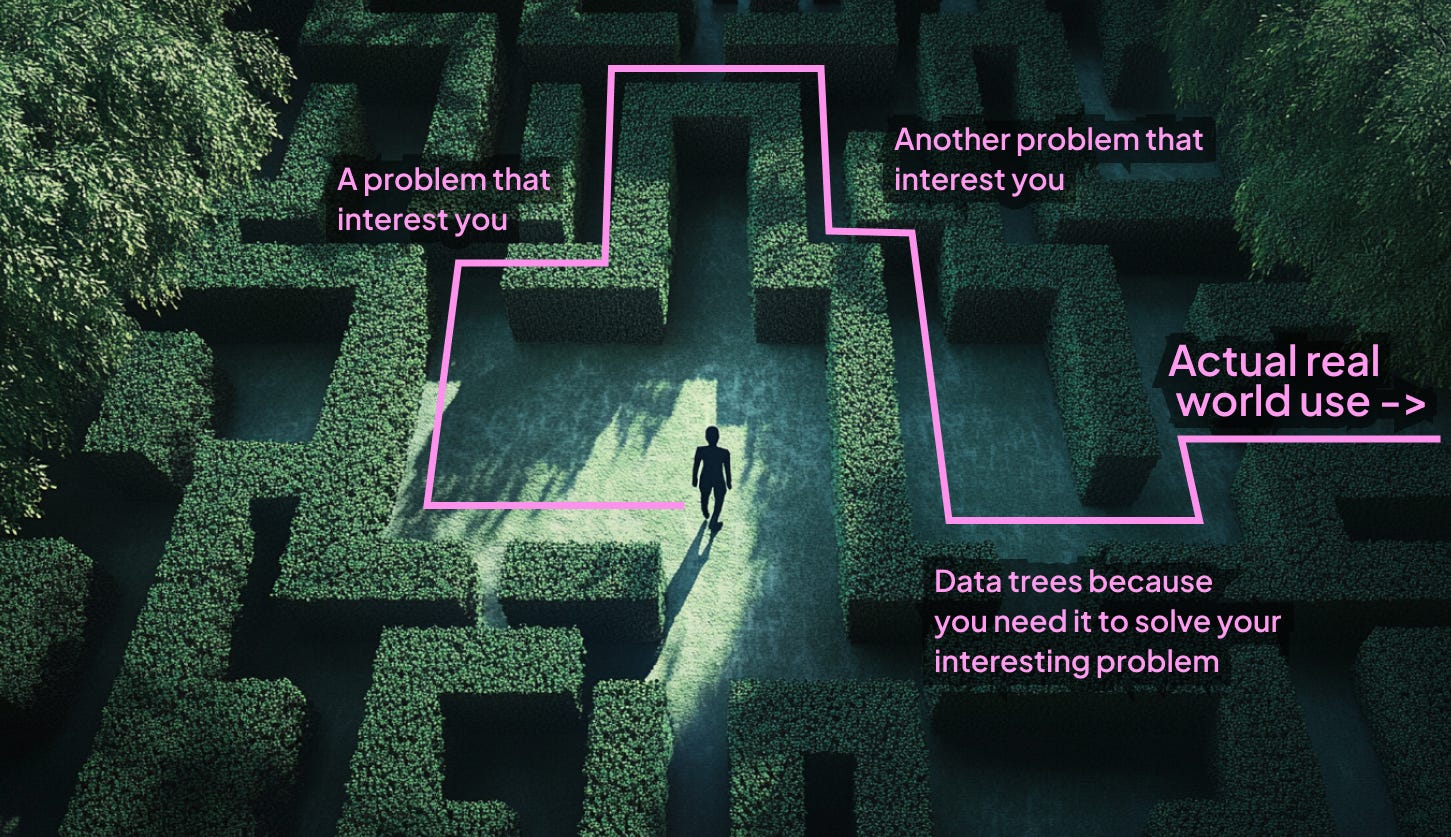Why Learning Grasshopper Feels Like a Waste of Time
We gotta stop talking about features all the time and start with what's relevant to you
Let's be honest: learning Grasshopper sucks.
To learn the program on your own, you have to follow random online tutorials or courses that have nothing to do with how you currently work. Why do I need to know what a data tree is? Are we planting bytes of data hoping it will grow into a strong gigabyte tree ? Am I supposed to just trust that spending the next 8 hours learning from "a masterclass in Grasshopper" will eventually lead me to the promised land of maximum efficiency?
Okay, rant aside. It's not that learning Grasshopper isn't valuable—it absolutely can be. The problem is the disconnect between how it's typically taught and how it's actually used.
The Fundamental Problem with Learning Computational Design
Like any serious topic, there will always be some benefit to learning. But when it's unclear how to apply it to your own work, it quickly feels meaningless. I know I struggle to learn anything if I can't see how I'll use it. Especially if doesn't remotely interest me. That maybe how you feel, you don't care too much about this computational design thing that everyone seems to yelling about but it feels like you're missing out if you don't at least try it.
The current landscape of Grasshopper courses only teaches you the features of the program: what points are, how it handles geometry, or how to use data trees. But this approach misses the mark, starting where it's first relevant to you. Maybe if you got lucky, you got a course that ends with something relevant but from what I have seen, that's rare.
I mean what's the point of learning about all of this if you don't know how Grasshopper will help you?
If you had to pick between a tool that might boost your productivity versus developing skills that will definitely get you promoted, which would you choose? I would pick being promoted over a tool that might help me, without even blinking twice.
The Flexibility Trap
The problem with Grasshopper is that it's too flexible. It caters to anything and everything, which paradoxically means it actually caters to no one specifically. This is what makes learning how to use the tool so difficult.
Generic tutorials show you how to create twisting towers or some fancy pattern—but what if you're a structural engineer trying to automate beam placements? Or an MEP designer trying to optimize duct routing? The disconnect between what's taught and what you need creates a gap that's difficult to bridge. You shut off thinking that Grasshopper isn't the tool for you.
It's also why I've hesitated to create a Grasshopper course myself. Effective learning starts from curiosity and what's applicable to your work right now. I'd rather be the person who shows you how Grasshopper is used in real-life projects than someone who teaches you abstract concepts and random Grasshopper tips.
It's like cooking. If I taught you knife skills before anything else. Like learning how to Julienne, Brunoise, Chiffonade, etc... (Yes, I googled top knife skills). You probably just walk out. But if I taught you how to cook your favourite childhood meal then show you how getting better at knife skills makes your cooking better. You have that curiosity and motivation to dive deeper. You can see how getting better at knife skills helps you cook your favourite meals.
This doesn't mean I don't respect those teaching Grasshopper fundamentals. It's just that if you're already working a 9-to-5 job, have a decent social life, etc. The last thing you need is another generic online course teaching you a tool without showing how it directly helps you.
A Better Learning Path
A better approach is seeing how the tool solves a problem that you're actually facing, which then sparks curiosity to dive deeper into more technical areas. It's a lot like learning anything, you just need a foot in the door. Let's get rid of the kitchen analogy and look at a scenario in real life.
Let's say you see a colleague, let's call him Ben, using Grasshopper to manage the staging of an ETABS model. You realized that you need to do something similar tomorrow. Instead of walking away, you're feeling creative. You reach out to Ben : "Hey, I have this problem, and I saw you solving something similar with Grasshopper. Do you think you could show me how you did that ?"
Ben, being the nice guy that he is, shows you how he used Grasshopper to solved a problem that's similar to yours. He's busy with his own work, so he shows you how to use the script and sends it to you. Reassuring you that it's not that complicated, just needs a bit of time to get used to it.
Now, you're curious and motivated because if you play your cards right, this script will save you hours of manual work. So, you open up the script and have no idea what's going on. But you're a curious and proactive person. You watch a few YouTube videos and experiment with Ben's original script. You're now dedicated, maybe even obsessed about getting this script to work. You've seen Ben do it, why can't you?
After a few days, you got it working but it's a huge script. And, you're tired and has spent way too much time. More time that it took to complete the task manually. But you now know more about Grasshopper than you ever did. You can see how it will help other parts of your work. You run into Ben again and both of you start chatting about your script. Ben suggested a few ways to improve it. Again, being really curious, you got some time to tweak and make improvements to your script.
Soon, you're making more scripts and using Grasshopper more and more because you've seen other areas where Grasshopper could help you. Then, one day, someone comes up to you "Hey, I have this problem, and I saw you solving something similar with Grasshopper. Do you think I could create something that helps me too?". And the cycle continues.
The Reality of Learning Computational Design
Okay, it rarely works like that. You might get busy halfway through or you give up because it's too hard. But I believe this approach—starting with a real problem you're facing—is the best way to learn. The hardest part is identifying where to actually use Grasshopper in your specific context and obviously finding the time is hard too.
But if you can reach out to people, share your challenges, browse social media to see how others are solving similar problems, it might inspire you. And when you make that connection between your problem and a computational approach, when you build something that actually helps you, you're hooked.
It's actually why I created Scripository. It's not an online course or a tutorial. It's a library of scripts drawn from my experience. It's designed to be there for you when you take that leap and want to build something on your own.
It doesn't make learning easier, nothing should make it easy, but it gives you the tools so you're not lost and alone. So that you're not stuck on your own trying to solve a problem that no one else around you understands. It's breadcrumbs that will hopefully lead you toward your own scripts. To your own promised land of efficiency
Paid members to CodedShapes get access to all the scripts.







